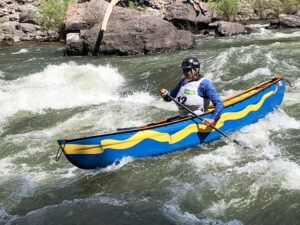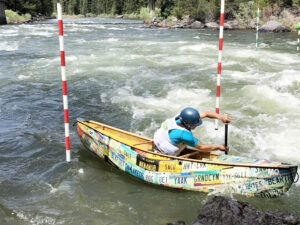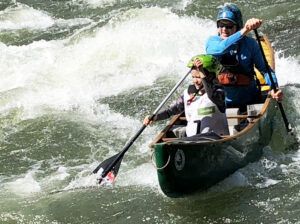
by Nathan Boddy
There may have been little fanfare, but Western Montana recently hosted a collection of top-notch athletes from around the nation. For three days along the banks of the Blackfoot River, the American Canoe Association (ACA) held the 2021 Open Canoe slalom championships. The event was hosted by Montana canoeists Brandon Salayi and whitewater canoe craftsman, John Gallagher, who are part of a Western Montana community that has formed around this niche sport.
Whitewater canoeing differs from recreational canoeing and kayaking. The canoes themselves have shapes conducive to response and movement, and the paddlers kneel in the hull rather than having their legs outstretched. To add stability, whitewater canoeists also use straps to hold their knees into place. “You wear the canoe,” says long time paddler and Florence resident, Chet Morris. “It’s an extension of your body. The canoe has a lot of leverage and if you bend at the waist you can get your center of weight down lower.”

On the water, skilled canoeists are able to maneuver their canoes in and out of eddies, behind obstacles and over substantial rapids. This year’s race, which occupied several hundred yards of Roundup Rapid just upstream of the Highway 200 crossing at Greenough, required contestants to paddle through 23 sets of gates, hung from above the river on wire lines. At least one-third of the gates required navigation in an upstream direction. Contestants are assessed time penalties for any gate they touch or fail to clear.
“It’s almost the difference between a Volkswagen bug and a Ferrari,” says John Gallagher, when asked about recreational canoes versus whitewater. “They’re faster, (and) they’re more responsive.” Gallagher, owner of Empty Canoes of Missoula, has been making whitewater canoes since 2010 when he and a small group of other canoe enthusiasts began constructing them in Gallagher’s garage. His boats make use of multiple layers of materials, which add to the performance of the canoe, while cutting down on weight.
The sport of canoeing, however, means more to this group of enthusiasts than just competition. Utility and a sense of community around the sport, are attributes that everyone at the Nationals seemed to agree upon. Morris, a certified paddle instructor with ACA, has decades of experience teaching people to enjoy paddling, which he does each year through the Missoula Trail Head. His take on canoeing is that, although less stable and more difficult than paddling a kayak, it is “more expressive” and in touch with the movement of the water.
Alan Burgmuller, longtime Bitterroot local and Whitewater Rescue Institute staff member, agrees, and adds that canoes are perhaps the most simple, yet most versatile of all water craft. “If you have a 16-foot canoe, you can paddle it solo, paddle it tandem, sail it, even stand up in it.” Both Morris and Burgmuller report taking multiple self-supported expeditions from their canoes as well. Says Burgmuller, “You can pack a lot of gear in it.”

Despite their dedication, however, whitewater canoeing is still relatively unknown outside a tight group of enthusiasts. John Gallagher says, “We are an endangered species, here in the northwest.” Gallagher, who traces his own history with the sport back to the early 90s, says that he got started after receiving a canoe from an acquaintance who no longer wanted it. “We didn’t know what it was, we had no idea how to paddle, how to get on a river,” he says, but before long an alliance seemed to grow around the activity. Within a few years, he’d met Alan Burgmuller, who chased him down after spotting a canoe on Gallagher’s car. “That’s how we formed as a crew and all came together.”
Chet Morris also points out that the group is small, saying, “It’s still kind of an esoteric… we’re an eclectic group of paddlers, who do this slalom racing.” Nonetheless, Morris would like to see the sport grow, especially in light of the fantastic water access that Western Montana enjoys. “You’ve got five rivers that all come together here. It’s been written up as a destination area to live if you’re into paddling.”
The good nature of the community was on display at Lubrecht Experimental Forest, where the bulk of paddlers camped during the event. At the awards ceremony on Sunday evening, event host Brandon Salayi invited everyone who ‘swam’ during the race to stand up. “More than half the people swam,” says Morris with a smile, pointing out that, “the sense of community is fabulous.”
Alan Burgmuller, who has spent years advocating for canoeing and was key in getting this year’s youngest cadet paddlers on board, says, “This is a gathering of people who love the sport.” He acknowledges that there is competition and people want to win, but says that the gathering is almost more like a family reunion. “It’s like a festival,” he says, “with a race associated.”
Joe Boddy says
Absolutely love being in a canoe.. Our Old Town was a flat bottom thing that worked well for an evening of bread and wine on a peaceful lake.. Along with it came a casset video showing some very skilled folks doing back ups behind boulders.. turn arounds and various paddle strokes.. Really amazing and fun.
Thanks for the article.. Well done of course..